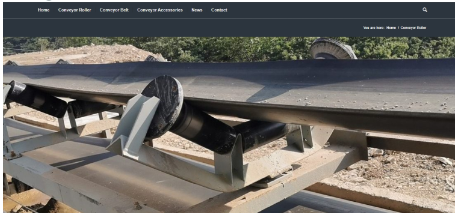Conveyor rollers are essential for optimizing material handling in manufacturing, mining, and other industrial operations. This guide explores the types of rollers, including steel, nylon, and rubber, detailing their applications and features. Specialized rollers, such as impact and low-noise rollers, enhance system performance under specific conditions. Learn how load capacity, speed, environmental conditions, and material composition impact roller selection.
Finally, understand where to buy from reputable suppliers and how to evaluate warranties, customization options, and customer support. By choosing the right conveyor rollers, you can ensure smooth, efficient operations, reduced downtime, and long-term value.
Exploring Options for Conveyor Rollers for Sale
Importance of Conveyor Rollers in Industrial Applications
Optimizing Material Handling:
- Conveyor rollers are integral to material handling systems in manufacturing, distribution, mining, agriculture, and more.
- They provide a smooth, efficient means of transporting goods, raw materials, or finished products across different stages of production and logistics.
- The seamless transfer reduces bottlenecks, maintains the product’s integrity, and supports consistent workflow.
Reducing Downtime and Maintenance:
- Properly selected and maintained rollers, including conveyor impact rollers, minimize the risk of breakdowns that can halt production. Reliable rollers are crucial for reducing unplanned downtime, extending conveyor system lifespan, and ensuring steady production output.
Adapting to Environmental Challenges:
- Conveyors operate in varied environments, from clean pharmaceutical facilities to dusty mining sites.
- Rollers must withstand harsh conditions like high temperatures, moisture, corrosive substances, and heavy loads.
- Specialized rollers, such as impact rollers, protect belts from the significant impact force generated during loading or transferring bulk materials.
Customizing to Industry-Specific Requirements:
- Rollers come in many designs, sizes, and materials to meet the specific needs of each industry.
- In food processing, hygienic plastic rollers are crucial to prevent contamination, whereas robust steel rollers are essential for mining applications.

Factors Influencing the Purchase of New Conveyor Rollers
Load and Speed Requirements:
- Evaluate the load-bearing capacity required, considering the weight and size of materials. Also, consider the speed of the conveyor system, as high-speed operations need precisely balanced rollers to minimize vibrations and reduce noise. Nylon conveyor rollers are particularly suitable in environments where lightweight, corrosion-resistant, and low-noise operations are desired.
Environmental Conditions:
- Identify environmental factors like temperature, humidity, dust levels, and exposure to corrosive chemicals.
- Materials like steel, high-density polyethylene (HDPE), and PVC are selected based on these conditions.
- Temperature-resistant coatings may be necessary for extreme climates.
Roller Material:
- Steel: Preferred for heavy-duty applications requiring durability and high load-bearing capacity.
- HDPE and PVC: Lightweight, corrosion-resistant materials suitable for food, pharmaceutical, or environments with high moisture and chemicals.
- Rubber: Offers impact resistance for loading zones, reduces material slippage, and protects the belt.
Roller Diameter and Shaft Size:
- Ensure the roller diameter is appropriate for the specific conveyor system.
- Shaft size should be compatible with bearing housings, frames, and existing system components.
- Larger diameter rollers can handle heavier loads but must fit within the system’s dimensional constraints.
Bearing Type:
- Ball Bearings: Provide low-friction rotation and are ideal for lightweight materials.
- Tapered Roller Bearings: Suitable for high radial and axial loads due to their conical design.
- Precision Bearings: Necessary for high-speed operations to minimize noise and vibration.
Customization Needs:
- Some industries need specialized rollers for unique applications, like grooved rollers to align products or rollers with coatings for static reduction.
- Trusted manufacturers can offer customization services to meet industry-specific requirements.
Compliance and Quality Standards:
- Ensure that rollers meet industry standards (e.g., ISO, CEMA) to guarantee safety and performance.
- Compliance with quality standards helps minimize the risk of failures and improves durability.
Supplier Reputation and Support Services:
- Select suppliers with a proven track record and positive customer reviews.
- Evaluate their after-sales support, including technical assistance, training, and availability of spare parts.
Cost vs. Long-Term Value:
- Balance initial cost with long-term operational value.
- Investing in higher-quality rollers can result in significant savings through reduced downtime and maintenance.
By understanding these factors, businesses can make well-informed decisions when exploring conveyor rollers for sale, ensuring they select the best options to optimize their conveyor systems for efficiency, reliability, and long-term value.
Types of Conveyor Rollers Available
Steel, Nylon, and Rubber Rollers
Steel Rollers:
- Overview: Steel rollers are the most common and versatile rollers in conveyor systems due to their robustness and load-bearing capacity.
-
Applications:
- Used primarily in heavy-duty applications, such as mining, construction, and aggregate handling, where the rollers must endure high impacts, abrasions, and harsh environmental conditions.
- Ideal for transporting heavy loads and bulky materials across long distances.
-
Features:
- High tensile strength for supporting large loads.
- Resistance to deformation under pressure.
- Suitable for environments with sharp temperature fluctuations.
- Often equipped with labyrinth seals for dust and water resistance, reducing maintenance needs.
Nylon Rollers:
- Overview: Nylon rollers offer a lightweight yet durable alternative to steel rollers.
-
Applications:
- Popular in industries where hygiene and corrosion resistance are crucial, such as food processing, pharmaceuticals, and chemical manufacturing.
- Ideal for conveying medium-weight materials with low friction.
-
Features:
- Lightweight, reducing energy consumption and stress on the conveyor drive system.
- Corrosion resistance and low water absorption make them suitable for wet or humid environments.
- Non-stick surface reduces the buildup of residues, essential for maintaining hygiene.
Rubber Rollers:
- Overview: Rubber rollers feature a metal or composite core covered in a layer of rubber, making them resilient and impact-resistant.
-
Applications:
- Commonly used in material transfer points where goods drop onto the conveyor, such as quarries, loading docks, and bulk handling facilities.
- Their cushioning effect helps protect the conveyor belt from damage caused by heavy or abrasive materials.
-
Features:
- Excellent shock absorption reduces belt wear and maintenance.
- Improved grip helps minimize material slippage, ensuring consistent product flow.
- Suitable for applications requiring low-noise operation.
Specialized Rollers Impact and Low-Noise
Impact Rollers:
- Overview: Impact rollers are designed specifically to absorb the shock from falling materials at conveyor loading or transfer points.
-
Applications:
- Used in high-impact areas like mining, ports, and bulk material handling, where large, heavy materials can cause damage to the belt or frame.
- Useful in protecting belts from sharp-edged materials or corrosive substances.
-
Features:
- Incorporate resilient rubber discs or rings fitted around a core steel roller to cushion the impact.
- Reduce conveyor belt wear, increasing the belt’s operational lifespan.
- Help minimize belt deflection and misalignment, ensuring smoother transport.
Low-Noise Rollers:
- Overview: Low-noise rollers are engineered to minimize sound levels in conveyor systems, creating a quieter work environment.
-
Applications:
- Beneficial in environments sensitive to noise pollution, such as distribution centers, airports, and food manufacturing plants.
- Improve conditions in urban or residential areas near the conveyor operations.
-
Features:
- Often made of lightweight materials like high-density polyethylene (HDPE) or aluminum, which generate less noise during rotation.
- Precision bearings and special labyrinth seals prevent rattling and vibration.
- Rubber or polymer-coated rollers further dampen sound by absorbing the vibrations from transported materials.
Selecting the Right Conveyor Rollers
Criteria for Choosing the Right Rollers
Load Capacity:
- Definition: The weight the conveyor rollers can safely handle without compromising performance or structural integrity.
-
Key Considerations:
- Understand the maximum and average weights of the materials being transported.
- Choose rollers with a high tensile strength core (e.g., steel) for heavy loads.
- Lightweight rollers (e.g., nylon or HDPE) are suitable for lighter loads, reducing strain on the conveyor system.
Speed Requirements:
- Definition: The velocity at which the conveyor system operates, impacting the wear and lifespan of the rollers.
-
Key Considerations:
- Higher speeds require precision bearings to minimize friction and heat buildup.
- Rollers must be balanced to avoid vibration or wobbling at high speeds.
- Opt for materials that are resistant to wear at high velocities, like steel or polyurethane-coated rollers.
-
Temperature Resistance:
- Materials like HDPE, nylon, and stainless steel offer high resistance to extreme temperatures, preventing warping or cracking.
- Specialized coatings can enhance temperature resistance.
-
Corrosion Resistance:
- Rollers used in wet or chemical environments should have anti-corrosive properties, such as stainless steel, nylon, or rubber-coated rollers.
-
Dust and Debris Resistance:
- Labyrinth seals and protective end caps prevent dust, sand, or debris from contaminating bearings.
- Smooth surfaces like nylon or HDPE discourage the buildup of residues.
Importance of Roller Diameter, Material, and Bearing Type
Roller Diameter:
-
Impact on Performance:
- Larger diameters distribute the load more evenly, reducing belt deflection and wear.
- Smaller diameters are better for lightweight materials and provide better control in tight spaces.
-
Application Specifics:
- Large diameters suit high-load, high-speed applications, such as mining or distribution centers.
- Smaller diameters are ideal for precision tasks, like product sorting or packaging.
Material Composition:
-
Steel Rollers:
- Suitable for heavy loads due to their high strength.
- Best for abrasive, high-impact environments like mining and construction.
-
Nylon/Plastic Rollers:
- Lightweight, reducing energy consumption.
- Resistant to corrosion and suitable for food or pharmaceutical industries.
-
Rubber-Coated Rollers:
- Cushion impact, reducing belt wear.
- Improve grip, reducing material slippage.
Bearing Type:
-
Ball Bearings:
- Ideal for high-speed applications due to low rolling resistance.
- Require lubrication to prevent premature wear.
-
Precision Bearings:
- Provide high accuracy for critical applications, minimizing vibration and noise.
- Suitable for noise-sensitive environments like distribution centers.
-
Sealed Bearings:
- Protect from contaminants, extending the roller’s lifespan.
- Recommended for dusty or wet conditions, where regular maintenance is difficult.
Where to Buy Conveyor Rollers A Guide to Finding Reputable Manufacturers and Distributors
Guide on Reputable Manufacturers and Distributors
-
Established Manufacturers:
-
Global Brands:
- GRAM Conveyor: GRAM Conveyor stands out globally for its innovative conveyor systems that cater to a wide range of industries. Their rollers emphasize durability and efficiency, incorporating state-of-the-art materials and designs. Their extensive product line includes advanced impact rollers, grooved rollers, and high-speed rollers, providing reliability for harsh environments and demanding operations.
- PROK: Specializing in low-noise aluminum and high-density polyethylene rollers.
- Igus: Known for lightweight, low-friction conveyor rollers with integrated ball bearings.
- Kinder Australia: Offers a broad range of impact rollers, rubber disc returns, and related conveyor system components.
-
Regional Specialists:
- Local manufacturers may offer specialized rollers tailored to specific regional industries, often providing better lead times for custom orders.
-
Criteria for Selection:
- Look for ISO or other internationally recognized certifications.
- Evaluate the range of roller designs available to meet different requirements.
- Assess their experience across industries to ensure compatibility with your specific needs.
-
Authorized Distributors:
-
Large Industrial Distributors:
- Examples include Grainger, Motion Industries, and Applied Industrial Technologies, which carry a wide variety of brands and offer centralized purchasing.
-
Industry-Specific Distributors:
- Some distributors focus on specific industries (e.g., food processing, mining) and offer rollers suitable for those unique requirements.
-
Criteria for Selection:
- Verify their relationships with manufacturers to ensure genuine products.
- Review their product catalogs for breadth of options and availability of replacement parts.
-
Online Marketplaces:
-
B2B Platforms:
- Platforms like Alibaba or Thomasnet list many conveyor roller suppliers, allowing quick comparisons between brands.
-
Criteria for Selection:
- Verify supplier credentials through customer reviews and ratings.
- Cross-check product specifications to ensure they meet your operational requirements.
Tips on Evaluating Suppliers
Warranty and Support Services:
Warranty Coverage:
Ensure warranties cover manufacturing defects, premature wear, and malfunction. Longer warranties often indicate the supplier’s confidence in their product quality. For instance, GRAM Conveyor provides comprehensive warranties, showcasing their dedication to high-quality products.
Support Services:
Look for suppliers who provide technical assistance during installation, operation, and maintenance. GRAM Conveyor offers technical guidance, helping customers optimize their systems. Evaluate the availability of on-site support for troubleshooting and repairs to minimize production delays.
Replacement Policy:
Verify if replacement rollers or parts are stocked or if they need to be custom ordered, impacting lead times. GRAM Conveyor maintains a well-stocked inventory to ensure quick replacements, reducing potential downtime.
Customer Service and Communication:
Responsiveness:
Suppliers should promptly answer inquiries or provide quotes. GRAM Conveyor has a responsive customer service team that addresses inquiries swiftly.
Customization:
Check whether the supplier is willing to accommodate custom requests, such as unique coatings, diameters, or bearing types. GRAM Conveyor provides tailored solutions to meet specific operational needs.
Industry Experience and Client References:
Portfolio:
Review case studies or projects where suppliers have provided similar rollers. GRAM Conveyor’s project portfolio reveals their extensive industry experience.
Client References:
Request feedback from past clients on product performance and after-sales support. GRAM Conveyor’s client reviews highlight consistent product reliability and service quality.
Product Quality and Testing:
Testing Standards:
Confirm that the supplier tests products under standard conditions (e.g., load, speed). GRAM Conveyor adheres to rigorous testing standards, ensuring optimal roller performance.
Quality Assurance:
Ask for quality certifications (ISO 9001) and adherence to industry standards. GRAM Conveyor’s compliance with international quality standards showcases their commitment to excellence.
By thoroughly evaluating potential suppliers like GRAM Conveyor based on these criteria, you can find a reputable partner offering high-quality conveyor rollers to meet your operational needs effectively.


